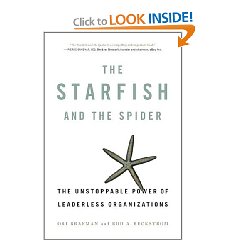 Super Book, Fast Read, Relevant to Participatory Democracy, June 3, 2008
Super Book, Fast Read, Relevant to Participatory Democracy, June 3, 2008
Ori Brafman
This is a very fine book, a fast read, and highly relevant to Web 2.0 and all the emergent opportunities to turn our world right side up, restoring power back to all the people. My reading has moved heavily toward cognitive science and “open everything,” and my avowed goal, apart from creating public intelligence in the public interest, is to make “true cost” visible to the public on every product and service, penetrating through the kinds of sway barriers this book describes.
Each chapter is excellent, with a nice teaser diagram. The book is double-spaced with adequate notes and index.
My flyleaf highlights:
+ Diagnosis bias is huge. [The book does not focus enough on how our “experts know more and more about less and less,” but the core point is valid: once their tiny little brain storage reaches a conclusion, they bend everything to fit it. this could also be called paradigm or disciplinary bias.]
+ Hidden currents in the individual and group decision support process include loss aversion, value attribution or negatiion, and a commitment to the wrong s trategy. Holy Cow. Talk about CIA, Microsoft, Google, CISCO, they are all there.
+ NBA draft is mostly guess and speculation [so is most intelligence “analysis” and both groups get away with it because they are not held accountable for getting it wrong.]
+ Labels *matter* and deeply influence outcomes.
+ Visualization *sells* just about anything.
+ Cues and subtle messages are nuanced and complex and omnipresent. I was really engaged by this section.
+ Need to be heard is vital and the more one does that, the more value is created (this is social networking 101, as Web 2.0 starts to go over the cliff so Web 3.0 can rise like a Pheonix.] The authors stress that those offering to listen must *hear* each individual voice.
+ Blockers matter, i.e. there have to be people in the loop who have the courage, the commitment, the *role* of saying no to abuses of authority including rankism. [I think of all our flag officers and Congress Members who refused to challenge the criminal lies of the White House and the abuses of power by the Vice President, all documented now in the open literature. Had Colin Powell resigned and called for a stop, he would be President in 2009, instead of those now running. all flawed in their own way [and each a testiment to how easily we are swayed by a lack of substance on the part of all three–visit Earth Intelligence Network to see the 52 questions none of the candidates can answer, and the 52 “starter” answers for a Citizens Summit to discuss (February 2009 in Chicago, over Lincoln's birthday).
Great little book. Here are some others I have found to be valuable:
The Structure of Scientific Revolutions
Manufacturing Consent: The Political Economy of the Mass Media
The Landscape of History: How Historians Map the Past
Voltaire's Bastards: The Dictatorship of Reason in the West
Group Genius: The Creative Power of Collaboration
The Age of Missing Information
Forbidden Knowledge: From Prometheus to Pornography
Fog Facts: Searching for Truth in the Land of Spin
Weapons of Mass Deception: The Uses of Propaganda in Bush's War on Iraq
Below is the first in a series of non-profit books (also free online), relevant to creating public intelligence in the public interest).
Collective Intelligence: Creating a Prosperous World at Peace



